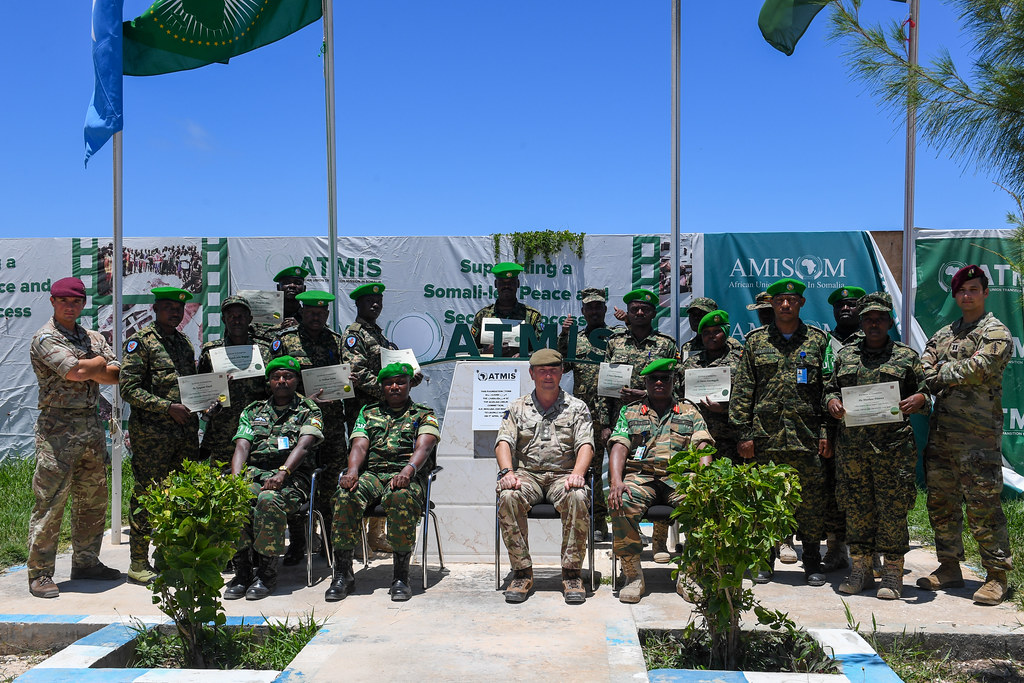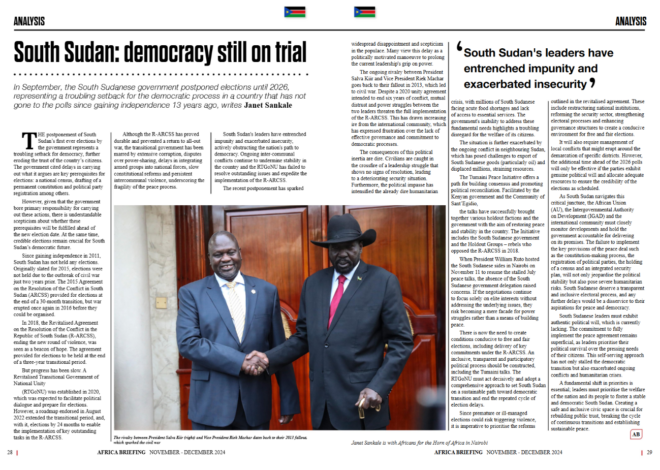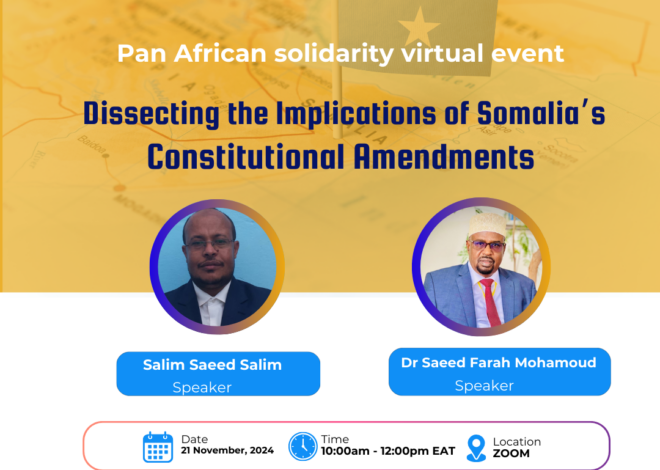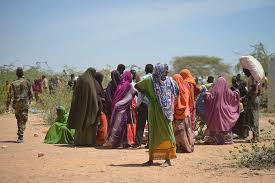
Troop withdrawal will leave Somalia exposed
As the African Union Transition Mission is being replaced, concerns have been raised over the ongoing Al-Shabaab insurgency in the country and a resurgence of piracy in the Red Sea that could destabilise the region further, writes Janet Sankale
Africa Briefing
The African Union – Peace and Security Council (AU-PSC), in its 1,225th session in August this year, endorsed the establishment of the AU Stabilisation and Support Mission in Somalia (AUSSOM), which will replace the African Union Transition Mission in Somalia (ATMIS). The Council approved the Concept of Operations (CONOPs) for the new AU-led mission, detailing its mandate, structure, benchmarks, duration
and the transition timeline from ATMIS to AUSSOM.
In August, too, the UN Security Council extended ATMIS’s mandate until August 15, as the mission was scheduled to have concluded at the end of June. This extension was due to ongoing concerns about the threats posed by Al-Shabaab to Somalia’s peace and stability.
Under UN Security Council Resolution 2710 (2023), ATMIS, formerly known as the African Union Mission in Somalia (AMISOM), is set to withdraw from Somalia and transfer responsibilities to the Somali authorities by the end of December this year. This transition necessitates a thorough assessment of the current security situation and the implications of the planned withdrawal.
ATMIS has been active since its deployment in 2007, taking over from AMISOM on April 1, 2022, after 15 years of service. ATMIS has played a critical role in countering Al-Shabaab and assisting in the stabilisation of Somalia. It has supported the Federal Government of Somalia in implementing the Somali Transition Plan, with the ultimate goal of transferring security responsibilities to Somali forces and institutions.
Despite these efforts, Somalia’s security situation remains too volatile to be managed solely by the country’s security forces. Funding shortfalls have led to the AU mission’s exit, creating operational gaps. Reports indicate that major funders, including the US, the European Union and the UK, have reduced their support for peacekeeping operations due to long-term financial and sustainability concerns. These donors believe it is time for Somalia and its internal security forces to take on the country’s security responsibilities.
As ATMIS prepares to withdraw, concerns persist regarding Al-Shabaab insurgency and a possible resurgence of piracy in the Red Sea. The Somali government has requested the delay of the withdrawal of half of the 4,000 troops (phase two) who were scheduled to have left by the end of June, asking them to remain until September. This is the second time Somalia has requested a delay in troop withdrawal due to battlefield setbacks, highlighting the country’s unpreparedness to manage its security sector fully.
The AU’s post-ATMIS assessment recognises the progress made since the mission’s deployment but expresses concern about a potential “security vacuum” that Al-Shabaab could exploit. The AU warns that the full implementation of phase three of the drawdown amid ongoing operations against Al-Shabaab could create capability gaps with significant security implications for Somalia and the region.
According to the Armed Conflict Location and Event Data (ACLED), Al-Shabaab carried out 26 attacks and six explosions targeting Somali security forces between March and April this year. The group’s activity has increased in Hirshabelle, particularly along the Shabelle river, near the Cali Fool Dheere forest, and around the villages between Balcad and Mogadishu.
Recent constitutional amendments have exacerbated tensions between the federal and state governments and among various clan members, leading to violence due to ineffective governance. If not properly addressed, these tensions could undermine efforts to consolidate state authority, which is crucial for reducing Al-Shabaab’s influence.
ATMIS has acted as a buffer against political turmoil, and its withdrawal could worsen existing tensions and impede efforts to build a cohesive and functional government. The already dire humanitarian
situation, compounded by ongoing conflicts, flooding, drought, poverty and insecurity, could deteriorate further, leading to increased violence, displacement and a worsening crisis.
Tensions between Somalia and Ethiopia have escalated due to an agreement allowing Ethiopia access to the Gulf of Aden through Somaliland, a move strongly opposed by Somalia, which disputes Somaliland’s sovereignty. The situation has further deteriorated with Somalia demanding the withdrawal of all Ethiopian ATMIS troops by December and threatening expulsion if the port deal is not cancelled.
Accusations of illegal border incursions by Ethiopian troops and confrontations with local security forces have exacerbated the situation. Analysts warn that the withdrawal of Ethiopian troops could lead to increased instability in Somalia, potentially strengthening Al-Shabaab’s activities due to the security vacuum.
The AU has pledged to safeguard the security gains achieved so far and ensure a stable and peaceful transition as post- ATMIS plans are underway. While there is consensus on avoiding the emergence of a security vacuum, uncertainty remains regarding the source of funding and which ATMIS contingents from friendly countries will be part of the post-ATMIS mission. The AU has emphasised the need for continued
international support, both in terms of funding and logistical assistance.
Establishing a new mission to fill the gap post-ATMIS is crucial as Al-Shabaab continues to expand its influence. Addressing these challenges is essential to ensure that security gains are not lost. Considering that Somalia has joined the East African Community (EAC), its security has implications for the entire East African region.
Somalia has long struggled with political fragmentation and a lack of central authority, which has profoundly affected democracy, human rights, economic growth and international relations. The country faces immense challenges in establishing effective governance and national security structures. Strengthening local security forces and fostering regional cooperation are crucial priorities to address these issues.
Janet Sankale is with Africans for the Horn of Africa in Nairobi.
Read the original article on Africa Briefing



